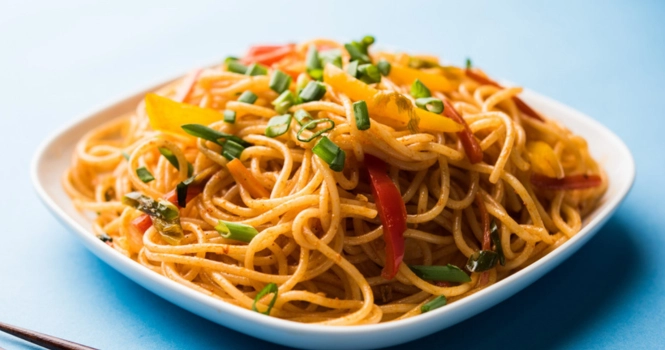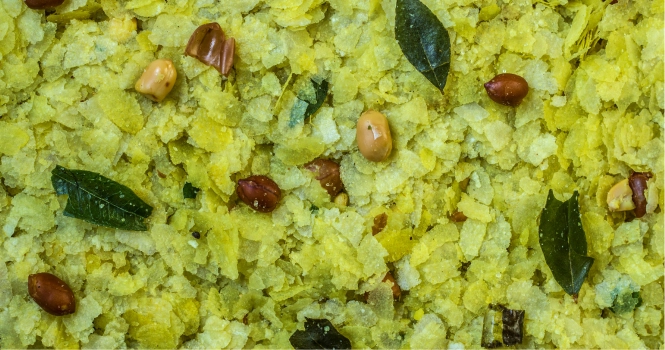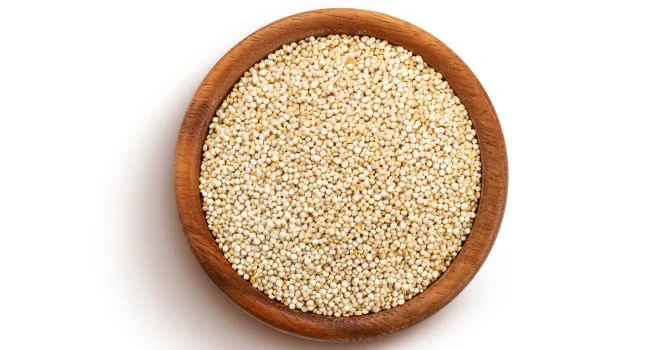Unveiling the Calories and Nutrition in Maggi Noodles

What are Maggi Noodles?
Maggi Noodles are a brand of instant noodles produced by Nestlé. Originating in Switzerland, they have become extremely popular in various countries, particularly in India. These quick-cooking noodles come with a flavor packet and are known for their convenience and taste. They are often enjoyed as a fast and easy meal or snack.
Let’s look into the calories and Nutritional Composition of maggi Noodles in this article.
Nutritional Composition of 1 Packet Maggi Noodles
| Nutrient | Amount in 1 Standard Packet of Maggi Noodles (Approximately 70-75g) |
| Calories | 350-400 kcal |
| Total Fat | 14-17 g |
| Saturated Fat | 6-7 g |
| Trans Fat | 0-1 g |
| Cholesterol | 0 mg |
| Sodium | 1000-1200 mg |
| Total Carbohydrates | 50-55 g |
| Dietary Fiber | 2-3 g |
| Sugars | 1-2 g |
| Protein | 7-10 g |
| Vitamins and Minerals | Minimal; varies by variety |
Varieties of Maggi noodles along with their approximate calorie content per packet
| Variety of Maggi Noodles | Calories per Packet (Approximate) |
| Maggi 2-Minute Noodles | 350-400 kcal |
| Maggi Masala Noodles | 350-400 kcal |
| Maggi Special Masala Noodles | 360-410 kcal |
| Maggi Chicken Noodles | 360-410 kcal |
| Maggi 2-Minute No Onion No Garlic Noodles | 340-390 kcal |
| Maggi Nutri-licious Atta Masala Noodles | 320-370 kcal |
| Maggi Nutri-licious Oats Masala Noodles | 330-380 kcal |
| Maggi Desi Cheesy Noodles | 360-410 kcal |
| Maggi Chatpata Noodles | 350-400 kcal |
| Maggi Vegetables Spinach Atta Noodles | 320-370 kcal |
| Maggi Fusian Bangkok Sweet Chilli Noodles | 350-400 kcal |
| Maggi Fusian Hongkong Spicy Garlic Noodles | 350-400 kcal |
Are Veg Atta Noodles better ?
The term “Veg Atta Noodles,” often refers to noodles made with whole wheat flour (atta) and vegetables. Comparing these to regular instant noodles, like the standard Maggi noodles made from refined wheat flour (maida), Veg Atta Noodles can offer some nutritional advantages:
1. Higher Fiber Content: Whole wheat flour is richer in dietary fiber compared to refined flour.
2. More Nutrients: Whole wheat contains more vitamins and minerals than refined wheat. Additionally, the inclusion of vegetables in these noodles adds to their nutritional value, providing vitamins, minerals, and antioxidants.
3. Lower Glycemic Index: Due to the higher fiber content, whole wheat noodles typically have a lower glycemic index compared to those made from refined flour, meaning they cause a slower rise in blood sugar levels.
4. Caloric Content: While Veg Atta Noodles might have slightly lower calories than standard Maggi noodles, the difference might not be significant. It’s important to check the specific product’s nutritional information.
However, it’s important to note the following:
- Processing: Despite being made with healthier ingredients, Veg Atta Noodles are still a processed food product. They may contain added salts, fats, and preservatives, similar to other instant noodles.
- Flavoring Packets: The health benefits can be offset by the flavoring packets that often come with high levels of sodium and artificial additives.
- Portion Sizes: Like any food, moderation is key. Portion size should be controlled to avoid excessive calorie consumption.
Adverse effects of eating Maggi Noodles
Consuming Maggi noodles frequently can have several adverse health effects due to their composition and nutritional profile:
1. High Sodium Content: Can lead to hypertension (high blood pressure) and bloating.
2. Low Nutritional Value: Lack of essential nutrients like fiber, vitamins, and minerals.
3. Unhealthy Fats: Presence of trans and saturated fats, contributing to increased bad cholesterol levels.Check the packet for details.
4. Refined Carbohydrates: Can cause spikes in blood sugar levels, particularly concerning for individuals with or at risk of diabetes.
5. Digestive Issues: Low fiber content and additives may affect digestion and gut health.
6. Weight Gain: High calorie and low nutrient density can contribute to weight gain if consumed frequently.
7. Potential for Harmful Additives: Some varieties may contain additives like MSG, which can be concerning for health. Check the packet for more details.
Moderation is key in consuming Maggi noodles, and they should not replace nutrient-rich foods in a balanced diet.
Frequently Asked Questions
1. Can we eat Maggi in diet?
Eating Maggi as part of a diet depends on the type of diet and nutritional goals. Maggi is a processed food high in carbohydrates and sodium, with limited nutritional value.
If you’re following a balanced diet, occasional consumption in moderation is generally fine. However, for weight loss or health-focused diets, it’s advisable to limit intake due to its high calorie and sodium content and lack of essential nutrients.
2. How many calories in a 12 Rupee Maggi?
The calorie content in a packet of Maggi noodles can vary slightly based on the specific product and region.
However, a standard packet (about 70-75 grams) typically contains around 350-400 calories. It’s important to check the packaging for exact calorie information for the specific variety you’re referring to.
3. How many calories are in Maggi pasta?
The calorie count in Maggi pasta differs based on the type and serving size. Generally, a standard serving of cooked Maggi pasta could range from 200 to 300 calories, but this can vary. For precise calorie content, refer to the nutritional information provided on the product packaging.
4. Can I eat 1 Maggi everyday?
Eating Maggi every day is not recommended as part of a balanced diet. While it’s convenient, it lacks essential nutrients like fiber, vitamins, and minerals.
Its high sodium and preservative content can also be a concern, especially for heart health and weight management. It’s better to have it occasionally and focus on a diet rich in whole grains, fruits, vegetables, lean proteins, and healthy fats.
5. Which noodles are healthy?
Healthier noodle options include:
- Whole grain or whole wheat noodles: Higher in fiber and nutrients.
- Buckwheat noodles (Soba): Rich in nutrients and gluten-free.
- Rice noodles: Gluten-free and lighter in calories.
- Shirataki noodles: Very low in calories, made from konjac root.
- Vegetable noodles: Made from spiralized vegetables like zucchini, offering nutrients and low calories.
Does Maggi have high calories?
Maggi noodles are relatively high in calories, primarily because they are made from refined flour and contain fats and oils.
A standard single serving (about 70-75 grams) can have around 350-400 calories, mostly from carbohydrates and fats. This calorie count is considerable, especially when compared to the calorie content of whole foods like vegetables or lean proteins.
How many calories are in 20 Rs Maggi?
The calorie content in a 20 Rs Maggi packet depends on the size and specific variety of the product. Prices can vary by region and the type of Maggi product.
Typically, larger packs have more calories. It’s essential to check the packaging for accurate nutritional information. A standard 70-75 gram packet, often priced around that range, contains about 350-400 calories.
Are 2 minute noodles fattening?
Whether 2 minute noodles like Maggi can be considered fattening depends on your overall diet and lifestyle.
They are high in carbohydrates and fats, and if consumed in excess, especially without adequate physical activity, they can contribute to weight gain. However, in moderation and as part of a balanced diet, they are unlikely to be directly fattening.
Can I eat noodles during weight loss?
Noodles can be included in a weight loss diet, but the key is moderation and choosing healthier options. Opt for whole grain noodles, which are higher in fiber and more filling.
Also, consider portion size and balance your meal with vegetables and lean protein. Regular Maggi noodles, due to their high calorie and low nutrient content, should be consumed less frequently.
Is Maggi considered junk food?
Maggi noodles are often categorized as junk food because they are highly processed and lack significant nutritional value.
They are high in carbohydrates, fats, and sodium but low in essential nutrients like fiber, vitamins, and minerals. Regular consumption of such foods is not recommended for maintaining a healthy diet.
![]()












